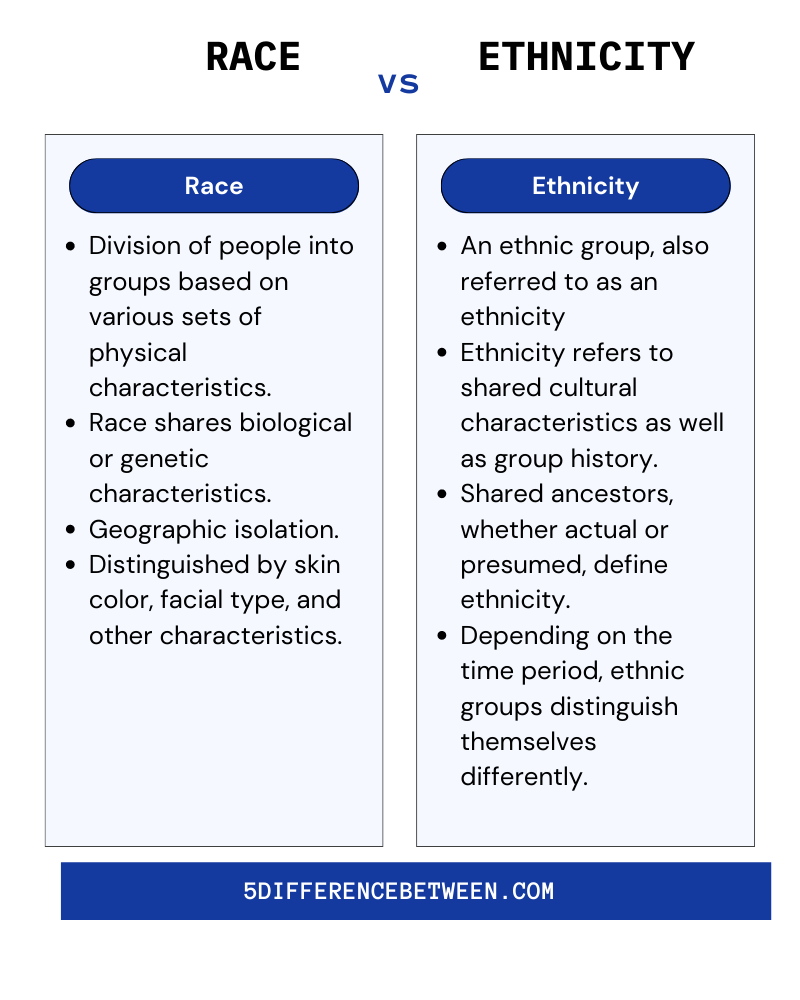Many people are perplexed by the terms race and ethnicity, which are frequently used interchangeably. However, there are significant difference between race and ethnicity that must be understood. Here we will outline five key distinctions between race and ethnicity and explain how they differ.
To understand the essential difference between race and ethnicity better to know what is race and ethnicity separately. So now let’s define race and ethnicity.
What is Race?
Race is a social construct used to categorize people into distinct populations or groups based on characteristics such as physical appearance (especially skin color), ancestry, cultural affiliation, and shared history. While physical characteristics can be used to identify individuals within a given population, race is a subjective interpretation of these characteristics rather than a scientific concept. Throughout history, race has been used to establish a social hierarchy, with certain races considered superior to others. Racial superiority has been used to justify discrimination, violence, and oppression against specific groups.
Also Read > Difference Between a State and a Nation
It has also been used to deny members of certain communities basic rights and privileges. The concept of race is extremely complex, with far-reaching implications. It can affect how people are perceived and treated, as well as how they perceive and interact with their surroundings. It can also have an impact on access to resources and opportunities like education and employment. In recent years, there has been a greater emphasis on the social and economic disparities that exist among different racial groups, as well as the importance of addressing these issues.
As our understanding of race evolves, it is critical to remember that race is a social construct that should never be used to make assumptions about individuals or groups. Understanding the implications of race and its role in society is also necessary for increasing understanding and acceptance among various communities.
What is Ethnicity?
Ethnicity refers to a group of people who share characteristics such as physical appearance, language, religion, customs, culture, and ancestry. It is a catch-all term for a variety of social, cultural, and historical identities. Race is determined by physical characteristics, whereas ethnicity is determined by cultural characteristics. Ethnicity is a way of identifying and connecting with others. It is a positive term that instills a sense of belonging and pride in people. It is often based on shared cultural experiences and a shared history rather than biological similarities.
Ethnicity is a constantly changing and evolving concept. Individual identities evolve over time, just like ethnic identities. People may identify with a single ethnic group, but they may also have multiple, overlapping ethnicities that reflect their ancestors’ complicated history as well as the current social landscape. Ethnicity is a complex concept that varies across cultures and societies. Ethnic identity is important to how people live their lives in some societies but not in others. Ethnicity can be a source of pride as well as conflict. Ethnicity is a powerful concept that can help people understand their place in the world and feel a sense of belonging to something bigger. It is a way of recognizing and celebrating the world’s cultural and experiential diversity.
Race Vs Ethnicity
What is race and ethnicity? Now to understand this lets see the differences.

Examples of race and ethnicityare frequently confused, but they are not the same thing. Race refers to physical characteristics, whereas ethnicity refers to a shared cultural heritage. Ethnicity is influenced by language, religion, and national origin, whereas race is a social construct based on physical characteristics. Understanding the difference between race and ethnicity can help us appreciate the diversity around us.







One Comment to “5 Difference Between Race and Ethnicity”